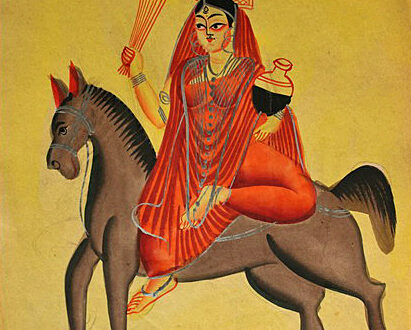Some Reflections on the First Day of Diwali
Over the last few years, every time Diwali season rolls around, I’ve begun to notice that my baseline feeling of disconnectedness from the original sources of meaning in my life grows by orders of magnitude. Today, on Dhanteras—the first day of the five-day festival of Diwali—that yearly growth begun once again.
When I woke up this morning, I received two message on WhatsApp. One was a forwarded image sent to me by my mom that said “Happy Dhanteras,” and another one was a voice recorded message from my dada, my maternal grandfather, from India. The message my dada sent was really well thought out and beautifully composed—they always are—but I just felt myself zone out while listening to it. To be honest, I’m not even sure I remember what he said.
It’s midnight right now, 12:00am, and I still haven’t responded. I know that I should. I should at least have sent a message back saying, “Happy Dhanteras!” It would have been really easy to do. But I didn’t. I know I’m a terrible son, grandson. To be honest, thought, it just felt like a meaningless phrase to me. And recently, I’ve gotten tired of saying things that no longer carry the same meaning that they did for me growing up. It’s not that I deny that it is meaningful to my parents and dada. I think it is genuinely meaningful for them. For me, however, it just felt like I would have been going through the motions if I said it, while being entirely devoid of emotion inside.
The meaninglessness, though, feels different from the kind of meaninglessness that accompanies exposure to cultural novelty. There is an excitement that accompanies going through the motions when you’re engaging with a culture different from your own, even when the motions themselves are somewhat meaningless to you. It’s a kind of emotionally rich meaninglessness. For me, it felt emotionally empty. It’s that “feeling” you get when you’re aware of what you’re doing, but you feel no connection to it. You’re disconnected from yourself, and the people you’re going through the motions with—in this case my parents and my grandfather.
Whenever a Hindu holiday comes around, I find myself searching Wikipedia and perusing through some Swadhyaya books that I have for some information about them. Today, was no different. I Wikipedia-ed Dhanteras. I read through a couple sections of some Swadhyaya books—Sanskriti Poojan, which talks about the significance of various Hindu festivals and symbols, and Dashavatara, which talks a bit about the Pauranika story of the churning of the oceans that’s said to be connected with the holiday. I read a section of the first book of the Mahabharata that recounts the same episode (which was, to my surprise, quite gruesome and horrific). I wanted to find something I could feel connected to, something that would make “Happy Dhanteras!” feel meaningful.
While I was doing all this research, though, I just felt like a disconnected observer. I read the two stories connected with Dhanteras. The first was about the churning of the oceans by the Devas and Asuras, from which emerges the god Dhanvantari—the god of traditional medicine or Ayurveda—with a vessel filled with amruta, an elixir of immortality. It honestly didn’t mean much to me. The second was about the son of King Hima, who was saved from death by his wife who distracted Yama—the god of Death—with metallic wealth at their front doorstep. I kept reading the second story, but all I could think about was, what text does this story come from. None of the sources I looked at revealed the answer. Point is, I didn’t connect.
I tried. I really did. I even tried to connect with what felt to me like platitudes about worshiping wealth or celebrating the victory of light over darkness. But it meant very little to me. I even thought about calling my parents to ask them what we used to do on this day every year to celebrate. I decided not to, because it would just bring up traditions connected with my upbringing in Swadhyaya that would make me feel even more disconnected.
I remember I used to find the elements of our household traditions that connected with Swadhyaya really meaningful, while I found the other elements not so much. I don’t connect with Swadhyaya anymore, so…you see my problem. Ever since I distanced myself from the Swadhyaya traditions that I grew up with, it’s been hard for me to reconnect with Hindu traditions. What makes it more difficult is that I’ve also cut myself off from belief in the supernatural. Because many Hindu traditions are deeply rooted in supernatural mythology, even when I want to and even try to connect with these traditions I end up feeling even more disconnected.
I find myself in a tough spot. I find myself wanting to connect with traditions, but whenever I try, I feel more disconnected. And if I try to start new traditions—and I really don’t even know where to begin with that—I also feel disconnected because I’d be the only one participating in those new “traditions.”
Maybe some day I’ll find my way out of this hole I’ve found myself in these past few years. But for now, I think I’m just going to share how I feel. Maybe some of you feel the same way, and we can feel this way together. Maybe we can find some connections in our shared feelings of disconnectedness. For the rest of you, for what it’s worth coming from me, happy Dhanteras.
